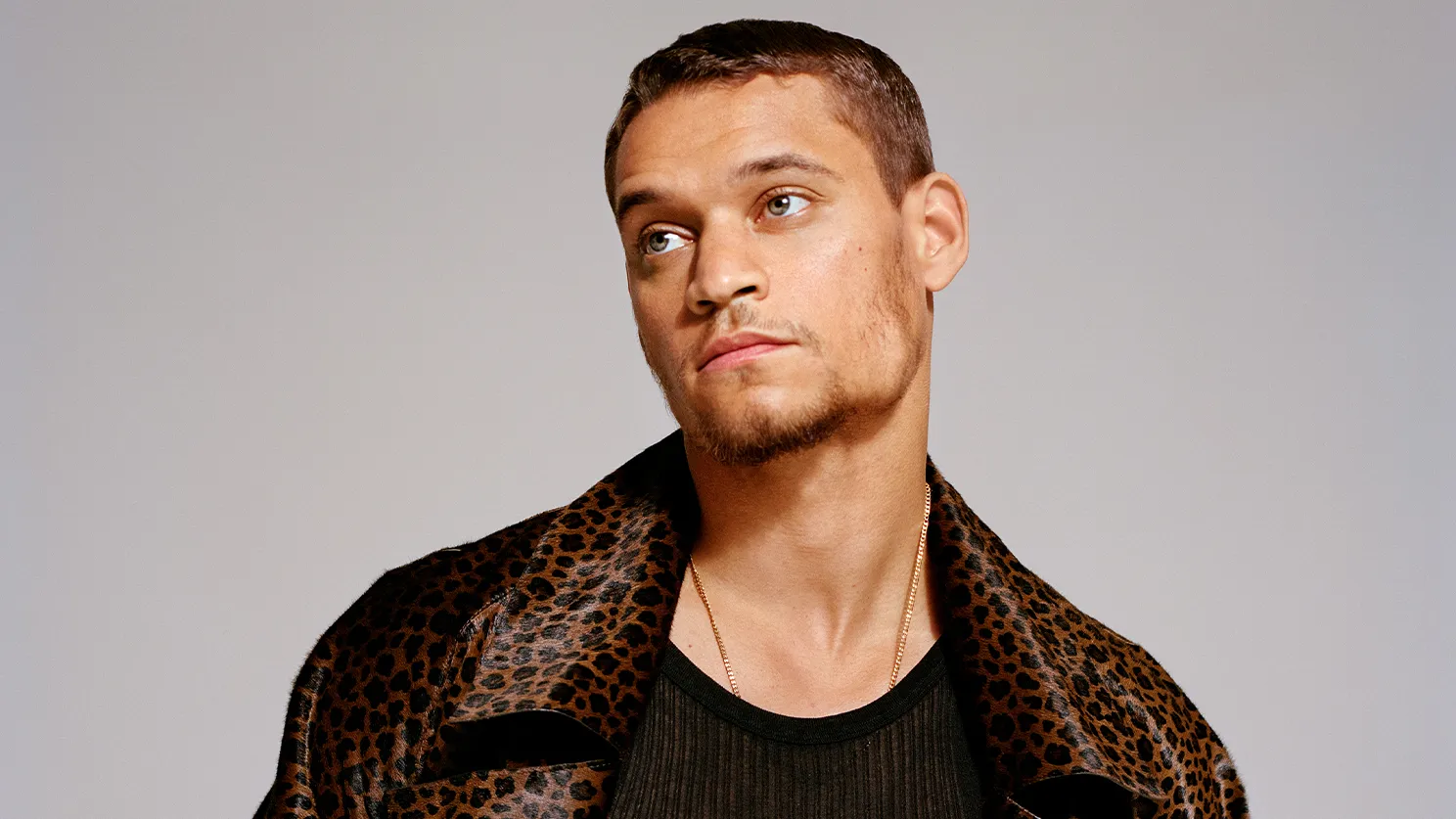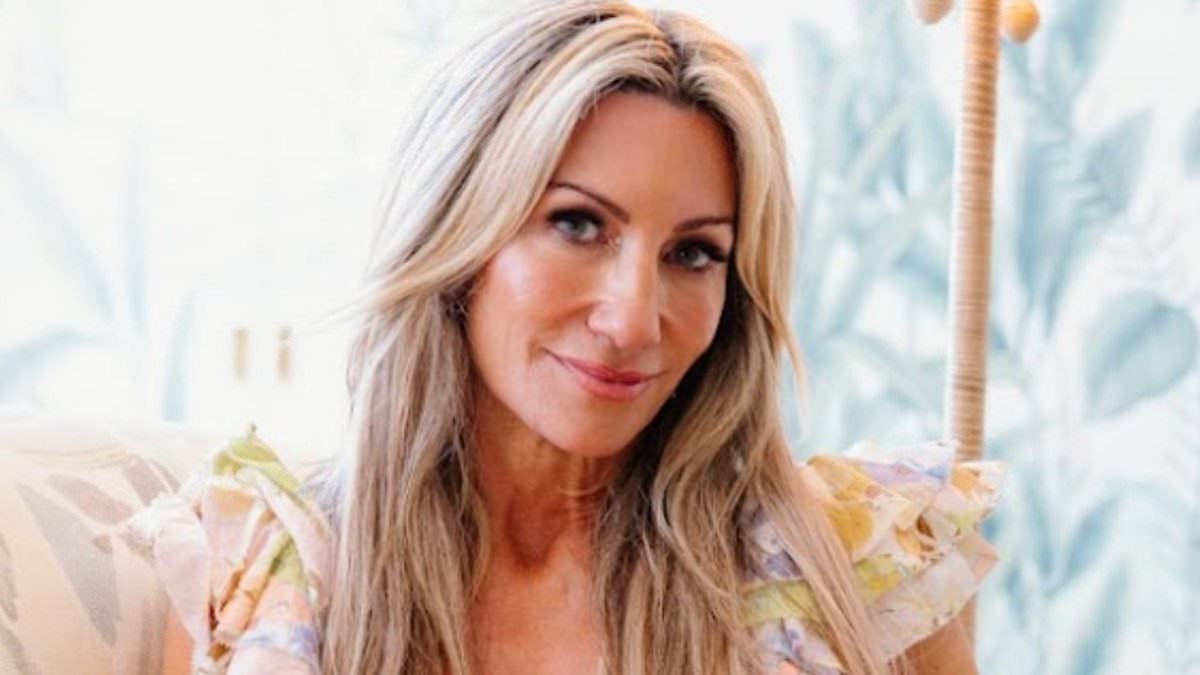By Hajar Benjida,Yang-Yi Goh
Copyright gq

If Tyriq Withers is attempting to blend in, he’s not doing a great job of it. The 20-something actor has just stepped into the Lower Manhattan restaurant where we’re meeting for dinner dressed the way most 20-somethings visiting New York might: baggy jeans, high-top Nike Dunks, a vintage Mets tee. It’s late May, so neither of his two big 2025 movies—July’s I Know What You Did Last Summer reboot and this month’s Jordan Peele–produced football horror flick Him—have hit theaters. And yet, simply by nature of his six-foot-five frame, Michelangelo statue bone structure, and gravity-well aura, the small handful of diners he strode past on his way to our corner booth all turned their heads, seeming to clock that he must be somebody.
In conversation, that duality between quiet naivete and movie-star charisma plays out over and over again. One moment, Withers seems like just a shy, sweet kid from Florida who’s still awed by the big city (“I don’t know New York. I tell my friends to come hang, and they’re like 40 minutes away—Sorry, I’m in Bushwick!”); who asks the server to skip the cilantro on his lamb shoulder because he doesn’t like the taste (“Sometimes I just say I’m allergic”); and who genuinely can’t believe he got to see Denzel on Broadway in Othello the night before (“A milestone”). The next, he’s speaking with Denzel-like gravitas and depth about race, identity, and the nature of grief.
He’s outrageously magnetic either way. It’s easy to see why no less of a creative powerhouse than Donald Glover plucked him out of obscurity in 2022 to star in “Rich Wigga, Poor Wigga,” the arresting third-season Atlanta episode that first put Withers in front of mainstream audiences and, more important, on the radar of Hollywood casting agents. Nor is it hard to understand how, with so few credits on his IMDb page, he managed to land a lead in Him, which sees Withers and the venerable Marlon Wayans squaring up as rival quarterbacks during an increasingly paranoid—and paranormal—offseason training camp. (For a movie hinging on a relative unknown, Him’s marketing hasn’t shied away from putting Withers front and center—right this moment you can see his bare torso plastered across an entire block of Times Square in full Michael Jordan “Wings” poster glory.)
Along with Him and I Know What You Did Last Summer, he’s also in 2026’s Colleen Hoover adaptation Reminders of Him. “I don’t know of any other actor whose debut is three studio movies back-to-back-to-back,” Him director Justin Tipping says. “And they’re all different in their own way—he’s a comic relief sidekick in one, he’s the main character in Him, and then he’s going on to a very dramatic role in a totally different tone.”
It makes sense. There are his legitimate acting chops, for one thing. There’s the strange air of destiny that’s supercharged his career thus far, with potent, meaningful projects seeming to find him at precisely the right junctures in his life. There’s the puppyish tenderness Withers brings to most interactions, causing experienced Tinseltown vets to earnestly rhapsodize about him. Take Jennifer Kaytin Robinson, the director of I Know What You Did Last Summer, who tells me, “Sometimes you meet people on that star trajectory and you’re like, Wow, this couldn’t be happening to a better person. Tyriq is such a fantastic, wonderful, kind, giving soul, and what makes me the most excited is that someone so deserving of immense success is going to get it.”
It’s not lost on Withers that Him is about a rising hotshot fighting to protect his soul from all the perils and temptations of new celebrity. “The movie is about, what are you willing to do to be the greatest?” he says. “Who are you, at the end of the day? There comes a time when you need to ask yourself, Why am I doing this and who am I doing it for? And I’m still on that journey.”
Actors who play athletes aren’t always all that athletic (here’s looking at you, Tim Robbins in Bull Durham), but Withers comes by it honestly. He grew up in Jacksonville, Florida, playing competitive soccer on a nationally ranked youth team, idolizing Ronaldinho and Ronaldo and Roberto Carlos. Withers and his older brother, Kionte, were raised mainly by their mother in the Sunshine State; his plan for himself was to get a D1 scholarship and then eventually go off to play in Europe somewhere. Instead, he wound up getting cut from his soccer team during his senior year of high school. “It was very traumatic,” he recalls. “You’re defined by this sport, and then suddenly you’re like, Holy shit, I don’t know what to do with myself.”
He wound up trying out for his high school football team and, in just a single season, managed to string together enough highlights to earn offers from multiple colleges. Withers ended up a walk-on wide receiver at Florida State. The Seminoles even won the 2017 Independence Bowl during his redshirt freshman season, but by the time spring semester rolled around, Withers had already begun to throw himself into something new: acting. FSU’s Black Student Union was putting on its first original play and had invited Withers to audition for the lead.
“I was still on the team,” he says, “and I remember lying to my coach like, ‘I can’t make practice; I got to do test corrections.’ But I was really prepping for this audition. I turned a Fresh Prince of Bel-Air scene—you know the one where he’s sad about his dad? How come he don’t want me man?—into a monologue.”
He got the part. “That was a wake-up call for me,” Withers says. “The play was about police brutality, and it was really moving. Just for me to go up onstage—I’m not saying I was good, but sometimes I look back at the video of it and get emotional, because that kid doesn’t even know what might come of this. It was a rebirth, in a sense.” Not long after, Withers officially quit the football team.
That experience helped Withers tap further into creative interests that had long been simmering. “My brother was the first one to pick up a camera and make videos, so that made me want to do it too,” he remembers. Starting in middle school, the duo filmed a string of silly early Vines and YouTube videos together. By the time he was in college, Withers was regularly vlogging and filming pranks and sketches for a now-defunct YouTube channel called TyriqTV, which racked up 137,000 followers: “That was my film school,” he says.
In 2020, after graduating college in the midst of the pandemic, Withers moved to Atlanta to pursue an acting career (while starting an MBA program online, just in case). It took him a few months to find his footing, but eventually Withers signed with an agent and fell in with an acting coach he loved. He started recording self-tapes and auditioning for productions around town. And then, just as things were starting to fall into place, his whole world changed.
On April 30, 2021, Withers got a call from his mom that his brother Kionte had been killed in a car accident. “I’d experienced grief before, but not like this,” he says. “It was just like, Fuck, take me instead. My brother had a son. He was a beautiful father, so soft and sensitive to my nephew. And what am I doing?” Withers puts on a faux-cheery audition voice: “Hey, my name is Tyriq Withers. I’m six-foot-five, Atlanta, Georgia, local.”
Withers came within inches of quitting acting for good to move home and help raise his nephew. “My partner at the time asked me, ‘What would Kionte want?’ And I came to the conclusion that the best way to serve my family is to continue on this path of chasing my dreams,” he says. “That gave me purpose. I started looking for him in every script.”
Not long after, he landed his Atlanta role. Withers originally auditioned for what he thought was a bit part, only to discover upon getting the job that he’d be playing the episode’s lead. Written and directed by Donald Glover, the story follows a mixed-race, white-passing high schooler named Aaron, who’s forced to prove his Blackness before a jury in order to earn a college scholarship. (Sample question: “Name six things that mix with Hennessey.”) For Withers, who actually did attend Florida State on a scholarship awarded to first-generation African American students, the whole thing hit impossibly close to home.
“I feel like my whole life has been an identity crisis,” he says, sitting up a little on the leather banquette and placing his fork down on his plate. “Who is Tyriq? He’s not white enough, he’s not Black enough. I couldn’t articulate it growing up.” Atlanta not only gave him the chance to work through those feelings, it allowed him to channel them into a tour-de-force performance under the watchful eye of a generational auteur. It also changed the trajectory of his career. “We shot in December, and I had finals for my MBA that week,” Withers says. “I was like, Fuck the finals.”
“Rich Wigga, Poor Wigga” opened a hallway’s worth of doors for Withers. He booked recurring roles on the Hulu college series Tell Me Lies and Paramount+’s revival of The Game, and then leveled up into that hat trick of major films: I Know What You Did Last Summer, Him, and 2026’s romantic drama Reminders of Him, in which Withers—in yet another part that parallels his life—plays a man grappling with the loss of his best friend to a car accident. As of last summer, he’s signed with a bigger talent agency and traded Atlanta for LA.
All of this momentum, Withers says, is powered by his ambition to do right by Kionte’s memory. “The night before my brother passed, he posted an Instagram story that said, ‘Tomorrow isn’t promised,’” he says. “I think that’s now the essence of everything I do. It calms me down whenever I’m anxious in a take: Tomorrow isn’t promised, so give your everything. And when you really live within that, great things happen.”
A few months later, Tyriq Withers is calling me from Dunder Mifflin. At least, that’s what his Zoom background wants me to believe.
“Hold on,” Withers says, stifled amusement and mild anxiety mingling in his voice. He’s leaning into the laptop camera, his greenish-gray eyes darting around the screen as, I presume, he fumbles through the app’s various dropdown menus and settings. “How do I…how do I fix this?”
I try to reassure him that we can just start the interview, and he flashes a megawatt grin. “I mean, I don’t want him listening in,” he says, fully laughing now, as he nods to the image of Michael Scott over his shoulder, peering through the blinds of The Office’s familiar taupe-walled conference room.
It’s mid-August now, and Withers is back home in LA for a beat, after spending most of the summer crisscrossing the country to promote I Know What You Did Last Summer. (His 27th birthday just so happened to coincide with the movie’s Hollywood premiere.) It was a modest hit and garnered Withers some critical praise for his scene-stealing performance, but it was always just a warmup for the main event: Him.
In the film, Withers plays Cameron Cade, a star college quarterback and projected number-one pick who falls out of draft contention after being injured under mysterious circumstances. That leads Cade to receive an invite from Isaiah White, an aging Tom Brady–esque QB played by Marlon Wayans, to fly out to his sprawling desert compound for a week of private workouts. Naturally, given this is a Monkeypaw joint, some disturbing shit goes down from there on out.
Despite Withers’s previous football experience, it still took a lot of work to make a former walk-on wide receiver believably appear to read options and launch perfect spirals like a pro-caliber quarterback. So Withers underwent an intensive six-week training camp with Jordan Palmer, the QB guru best known for working with Josh Allen in the offseasons. Three days a week, Withers would suit up alongside future NFL draft picks and run through everything from throwing mechanics to drawing up plays to leadership skills.
“The number one thing Jordan Palmer taught us is you gotta have confidence to be a quarterback,” Withers says. “And that level of confidence is not innate in me. I sometimes deal with imposter syndrome, and to be a quarterback, you can’t even for the slightest second tap into that mindset. I’ll take that with me for the rest of my life.”
By the end of camp, Withers had the physical abilities down to match his newfound conviction. “It was insane,” says Justin Tipping, Him’s director. “We’d get sent this footage of him training with Palmer and the other draft-class quarterbacks, and I couldn’t even tell the difference. There’s one shot in the movie where he turns and hits the goalpost with the football from like 30 yards away. He did it in one take.”
Meanwhile, Withers and Marlon Wayans quickly formed a bond on set. As Wayans tells me, “I looked at the parallels of the relationship [between our characters]. And where Isaiah was twisted, I wanted Marlon to not fail the younger person. I wanted to take him under my wing and protect him and guide him in a way that didn’t come from a place of insecurity or feeling threatened. So immediately, I took to him like a little brother. We started out with finances—I was like, Don’t buy that dumb shit.”
That level of connection was especially necessary because, once the cameras were rolling, Wayans began throwing everything and the kitchen sink at his scene partner. “He had a hard job, because I was untethered,” Wayans says. “And if you look at it, brother didn’t have a false moment in the movie. I’m really proud of our connection. I always wanted it to feel like Denzel and Ethan Hawke in Training Day.”
In the midst of all the Nike-commercial-esque training sequences and high-voltage supernatural freakiness, by far the most striking scene of the movie is one of its quietest: Cameron sits at the center of a Last Supper–inspired dinner table and recounts his complicated feelings toward his late father, as the camera slowly pans in on his tear-stricken face.
Withers had initially prepared for that scene to be played more like a straightforward postgame presser, void of any real emotion. “And then literally an hour before we film the scene,” he remembers, “Justin’s like, I want you to go there. Let’s empty the clip.” To get to the right place emotionally, Withers called upon conversations he’d had with both Tipping and Wayans about the grief they felt after losing their parents.
The thing that truly took him over the edge was thinking about his brother. “I had a trigger phrase in that scene that was really rooted in my own experience: ‘I let him down,’” Withers says. “In that moment I thought about the times I felt like I let my brother down—the times I could’ve easily gone home to visit him and didn’t, because I was so lost in this vision of success; or the embarrassment I felt from hiding and not chasing my dreams after he passed away.”
When Tipping called “Cut,” he says, the entire room was in stunned silence, and many crew members were brought to tears—as were the editors who later went through the dailies. “I’ve only ever heard myths about Meryl Streep, how she’s able to hit that note over and over and over again,” Tipping says. “And here Tyriq is—on the set of his first studio movie as a leading man—and to watch someone have so much control over their body, craft, and emotions all at once? That’s the one moment I could point to and say, Yeah, I think we’re witnessing the birth of a star.”
Marlon Wayans told me I needed to ask Tyriq about the worst date of his life. When I do, he starts blushing and giggling—not unlike the way he did while scrambling to get rid of the Dunder Mifflin backdrop—and then launches right into it. Naturally, Withers is an absorbing storyteller, with a way of making you feel like you’re shooting the shit on two barstools even over Zoom.
It’s a long and twisty anecdote, as all the best bar stories are, but here’s the gist. Fresh off filming Atlanta, when Withers was still dead broke, he came out to LA to crash on a friend’s couch. One night, he was introduced to someone he’ll only describe as “a very successful young lady” and persuaded her to go on a date.
From that point on, Withers proceeded to make a series of sweet but comically boneheaded decisions in an attempt to impress his date. He bought her an enormous birthday balloon in lieu of flowers, which bobbed awkwardly between them in the Uber to the restaurant and had to be tied to her chair when they got there. After she turned down a server’s offer of a box for her barely eaten, very expensive meal, Withers asked if he could take her food home. Finally, after an awkward ride home, Withers gave it one last shot to finish on a high note: “I was like, ‘I had a fun time with you. You really look lovely. Good night…mi amor.’ I called her ‘mi amor’—an insane thing to do.”
At this stage, we’re both cracking up, and I casually imply that was probably the last he ever saw of her. “Oh, we actually had a second date,” Withers says. “It was lower stakes, we went to some hole-in-the-wall bar, so I was more chill. She was like, ‘I like this version of you.’”
The reason Wayans wanted me to ask Withers about this wasn’t to embarrass him—it was to encourage him not to hide or be ashamed of his most authentic self. “It makes him turn red, but it’s so cute,” Wayans says. “There’s such a sweetness about him, and I encourage him to smile more, enjoy the laughs, and allow yourself to get egg on your face. There’s nothing better than a pretty boy with a cute heart, so embrace that and have fun with this journey and don’t fuck this up.”
Over and over again while talking to Withers’s colleagues and friends, I heard endearing stories like this one. Colleen Hoover, the novelist and screenwriter of Reminders of Him, told me about how he’d rope everyone on the set in to film goofy TikToks together, and how his stand-in pulled her aside one day to say that “Tyriq was so cool and patient, and it was the first time he felt he could actually learn from the actor he was standing in for.” His roommate Nicholas Duvernay, best known for his role as Zion in The White Lotus season three, described him as the guy that will stroll into the center of an uptight industry party, start doing “the most heinous dance moves you’ve ever seen,” and somehow “create a small pocket of people who are actually having fun.”
And a couple of folks expressed the same mild concern as Wayans—that the pressures of the spotlight might cause Withers to lose his charming innocence, the spark that allows him to unselfconsciously call his famous date “mi amor” or accidentally show up to a GQ interview with an Office-themed Zoom background.
“Of course, you want all the good things for him, but you can’t have those good things without the bad coming with it,” Hoover says. “I want him to achieve the highest levels of success. I want him to get all the roles. But at the same time, I just want to put him in a bubble and protect him. ” Still, everyone seems to agree on one thing in particular: As far as Withers’s potential is concerned, the sky is the limit.
During his rare downtime before the Him promotional machine fires back up again in earnest, Withers has been plotting out his next moves, taking meetings with filmmakers, reading scripts. But mostly, he says, he’s been “doing intentional things with friends, things that make me happy, things I want to do.”
For instance: He recently chartered a fishing boat, piled a few pals aboard, and drove out into the middle of the Pacific. It was his first time ever fishing on the ocean, but he’d grown up doing it with his grandfather and brother on a small lake out in the mountains of North Carolina.
“I think fishing is a good microcosm for life,” Withers says, beaming wistfully. His grandfather would wake the boys up at five, stuff them full of blueberry pancakes and syrup, and then load up the car with all his carefully prepped gear. “So we drive up into the mountains,” he says, “and you find a spot that’s really tucked off, and you just kind of feel out the area. Nobody’s there to tell you, ‘Fish are here.’ You just have to kind of earn that, you know? You wade through the water and you sit there.”
In fishing, he continues, voice rising eagerly, “you don’t know what you’ll catch, if you’ll catch something. And there’s the thrill of catching a fish, but also the thrill of catching and then losing a fish, and you just got to keep going to the next one, onwards and upwards. And even when you do catch a fish, you’re only as good as your last fish, in a way, but you can’t think of it that way. You spend a lot of time with yourself and nature, and it’s you and that fishing pole, and if you allow your brain to wander off, things won’t happen for you. You have to tap in. It’s like a certain frequency with fishing, and it grounds me. Next thing you know, it’s time to go.”
That day on the ocean, he and his friends hauled in 15 fish.
PRODUCTION CREDITS:
Photographs by Hajar Benjida
Styled by Haley Gilbreath
Grooming by Barry White for barrywhitemensgrooming.com
Tailoring by Carlos Sanchez At Lars Nord Studio



